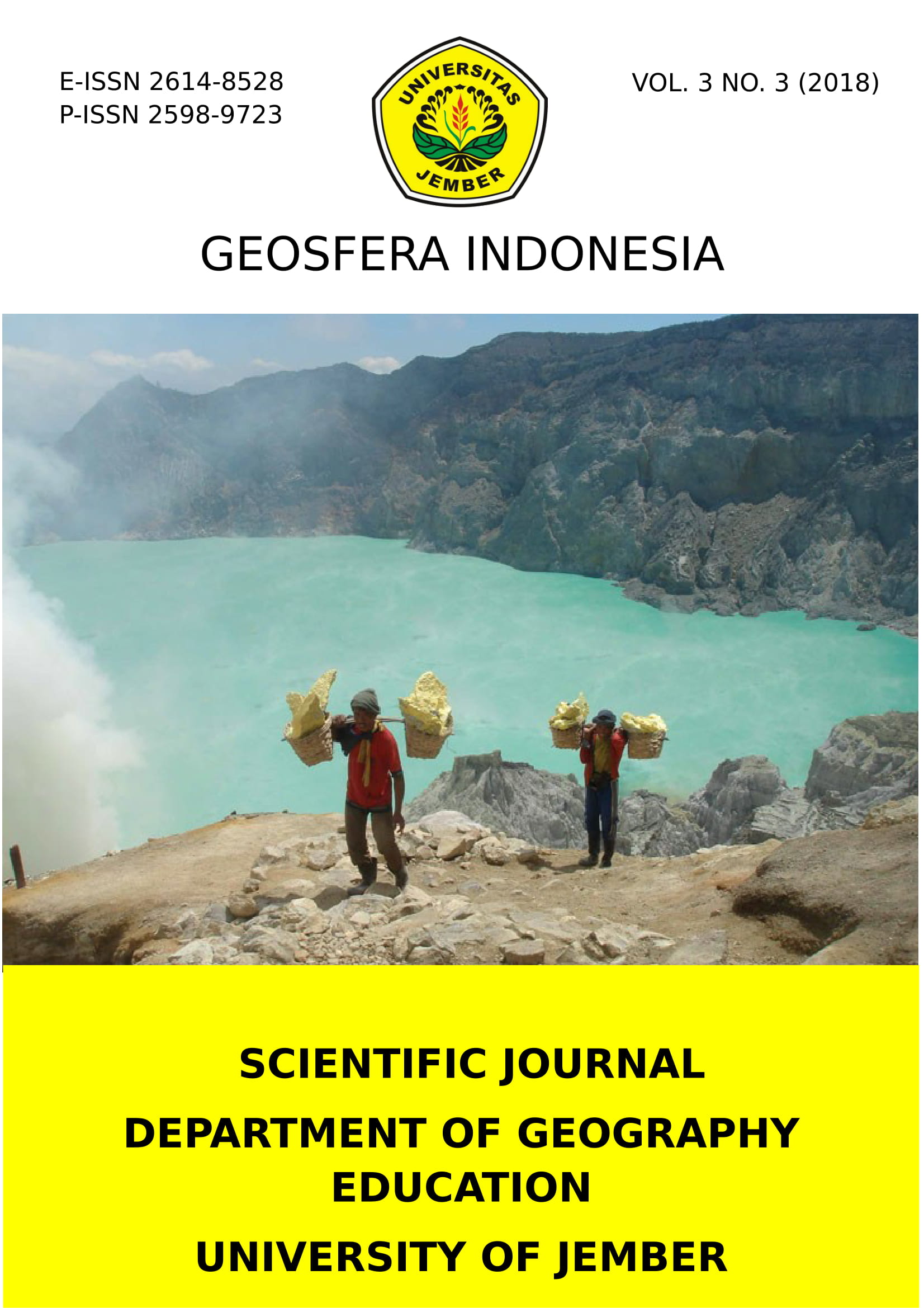THE EFFECTIVENESS OF PROJECT-BASED LEARNING AND PROBLEM- BASED LEARNING MODELS TOWARDS GEOGRAPHY LEARNING OUTCOMES IN TERMS OF STUDENTS’ LOCUS OF CONTROL
DOI:
https://doi.org/10.19184/geosi.v3i3.8790Keywords:
Project-Based Learning, Problem-Based Learning, Learning Outcomes, Students’ Locus of Control.Abstract
Nowadays, Indonesian’s education seems to have an improvement in its quality. The government is establishing the 2013 curriculum. However, its implementation has not been well-implemented. In regard to this problem, it is necessary to apply scientific learning models: PjBL and PBL models. With these models and according to the students’ locus of control, it is expected that it will improve students’ learning outcomes. This study is aimed at determining the effectiveness of PjBL and PBL models towards learning outcomes in terms of the students’ Locus of Control. The method used in this study was experiment, with 2x2 factorial design. The population was XI IPS students of SMAN 1 Ngaglik. The samples were 32 experimental students of PBL model and 28 experimental students of PjBL model. The data were collected using questionnaires and tests. The data were analyzed using Two Ways ANOVA. The result of the analysis shows that there is an influence between the models and students’ locus of control towards the learning outcomes. The value of Fcal5.488>Fstd4.00 and the value of the probability is 0.023 < 0.05.
keywords : Project-Based Learning, Problem-Based Learning, Learning Outcomes, Students’ Locus of Control
References
Akdeniz, C., Bacanli, H., Baysen, E. Cakmak, M., Çeliköz, N., Doğruer, N., Eristi, B., Erisen, Y., Eyyam, R.,Gündoğdu, K., Karatas, E., Karatas, S., Kaybasi, Y., Kilic, D., Kurnaz. A., Menivis, I., Özerbaş, M. A., Özü, O., Silman, F., Sünbül, A. M., Sahin, M., Tok, H., Yalin, H. I. Ed: Kaya, Z., Akdemir, S. (2016). Learning and Teaching: Theories, Approaches and Models. Tukiye: Çözüm Eğitim Yayıncılık. Retrived from: https://www.researchgate.net/publication/304119354, 14 September 2018
Alavi, C. (1995). Problem –Based Learning in a Health Sciences Curriculum. London: Routledge. Retrived from: http://en.booksee.org/s/?q=problem+based+learning&t=0, diakses pada tanggal 16 september 2018.
Duch, B.J., Groh, S.E., Allen, E.D. (2001). A Pratical “How To†for Teaching Undergraduate Courses in Any Disipline: The Power of Problem Based Learning.Virginia: Stylus Publishing, LLC. Retrived from: http://en.booksee.org/s/?q=problem+based+learning&t=0, diakses pada tanggal 15 september.
Fathurrohman, M. (2015). Model-model Pembelajaran Inovatif. Yogyakarta: Ar-Ruzz Media.
Hosnan, M. (2014). Pendekatan Saintifik dan Konsektual Dalam Pembelajaran Abad 21: Kunci Sukses Implementasi Kurikulum 2013. Bogor: Ghalia Indonesia.
Krauss, J.& Boss, S. (2013). Thinking Through Project-Based Learning, Guiding Deeper Inquiry.USA: A Sage Company.
Kreitner, R., dan Kinicki, A. (2005). Perilaku Organisasi. Jakarta : Salemba Empat.
Maysara. (2016). “The Effectiveness Of Problem Based Learning (PBL) Model On Students’ Learning Outcomes At Class Xi Ipa 2 Of Senior High School 5 South Konawe On The Subject Of Colloid Systemâ€. International Journal of Education and Research, 4(7). Halu Oleo University, Kampus Bumi Tridharma. Internasional Journal of Education and Research. ISSN: 2411-5681.
Pangestika, R. P. (2015).“Keefektifan Model Inquiry dan Discovery Dengan Pendekatan Saintifik Dalam Pembelajaran Geografi Ditinjau Dari Locus of Control di SMA Kabupaten Pemalang. Tesis, tidak diterbitkan. UniversitasNegeri Yogyakarta.
Prahesti, H.C . (2017). Eksperimen Model Pembelajaran Problem Based Learning Dan Project Based Learning Pada Pembelajaran Matematika Terhadap Hasil Belajar Ditinjau Dari Keaktifan Belajar Siswa. Skripsi, Diterbitkan. Universitas Muhammadiyah Surakarta. Retrived from: http://eprints.ums.ac.id, diakses pada tanggal 17 Oktober 2018.
Purwanto. (2013). Evaluasi Hasil Belajar. Yogyakarta: Pustaka Pelajar.
Riduwan. (2012). Dasar-Dasar Statistika. Bandung: Alfabeta.Saefuddin.
A. & Berdiati, I. (2016). Pembelajaran Efektif. Bandung: Rosda.
Sani, R. A. (2017). Pembelajaran Saintifik Untuk Implementasi Kurikulum 2013.Jakarta: Bumi Aksara.
Santria, U. (2018). Efektifitas Model Project Based Learning dan Model Problem-Based Learning Ditinjau dari Prestasi Belajar, Kemampuan Komunikasi Matematis, dan Kemampuan Interpersonal Siswa Materi Statistika dan Peluang Kelas VIII. Tesis, tidak diterbitkan. Universitas Negeri Yogyakarta,Yogyakarta.
Sari, N. H. Y. (2018). Efektifitas Model Pembelajaran PJBL DanPBL Untuk Meningkatan Hasil Belajar Geografi Ditinjau dari Locus Of Control Siswa Sma Negeri Ngaglik, DIY. Tesis. Program Studi Pendidikan Geografi. Program Pascasarjana. Universitas Negeri Yogyakarta.
Susanti, D., Rahma, R.M., Monalisa. (2017). Pengaruh Locus of Control Terhadap Kemampuan Pemecahan Masalah Matematika. Journal Nasional Pendidikan Matematika. Retrived from: www.researchgate.net, diakses pada tanggal 17 Oktober 2018.
Syatriadin. (2017). Locus of Control: Teori Temuan Penelitian Dan Reorientasinya Dalam Manajemen Penanganan Kesulitan Belajar Peserta Didik. Jurnal Pendidikan Dasar. 1(1). e-ISSN 2579-6194; 144-164.
Wicaksono, U. (2016). Keefektifan Model Pembelajaran Problem Based Learning dan Discovery Learning Berdasarkan Adversity Quotient terhadap Hasil Belajar Geografi SMA di Kabupaten Wonogiri. Tesis, tidak diterbitkan. Universitas Negeri Yogyakarta
Copyright (c) 2018 Geosfera Indonesia Journal and Department of Geography Education, University of Jember

This work is licensed under a Creative Commons Attribution-Share A like 4.0 International License



